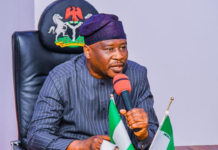President Bola Tinubu has approved a request by the Nigerian National Petroleum Company (NNPC) Ltd to utilize the 2023 final dividends due to the federation to pay for petrol subsidy.
The president also approved the suspension of the payment of 2024 interim dividends to the federation in order to augment NNPC’s cash flow and address the growing fuel subsidy burden.
President Bola Tinubu has approved a request by the Nigerian National Petroleum Company (NNPC) Ltd to utilize the 2023 final dividends due to the federation to pay for petrol subsidy.
The president also approved the suspension of the payment of 2024 interim dividends to the federation in order to augment NNPC’s cash flow and address the growing fuel subsidy burden.
Under the Petroleum Industry Act (PIA), the NNPC is obligated to pay taxes and royalties as well as dividends to the federation, its sole shareholder. However, the company has been struggling to meet its obligations due to the growing fuel subsidy burden.
In June 2024, the NNPC had cried out to Tinubu that the subsidy payments were negatively impacting its cash flow and it was struggling to remain a “going concern”. The company said it might not be able to sustain petrol imports because of the ballooning subsidy bill, which it blamed on “forex pressure”.
The president has approved the request of the National oil company.
Previously, NNPC’s group CEO, Mele Kyari, informed the president that when subsidy was removed in 2023, it led to monthly savings of N400 billion to the federation. However, the development was short-lived due to the devaluation of the naira, which led to a month-on-month escalation in the NAFEX exchange rate.
The NNPC has implemented several strategies to address the subsidy challenge, including improving oil production, debt rescheduling, and payment deferrals to suppliers and contractors. However, the situation remains dire, with projections showing a consistent increase in cash flow deficit mainly due to the exchange rate.
The petrol subsidy bill is expected to gulp over N5 trillion this year alone.





